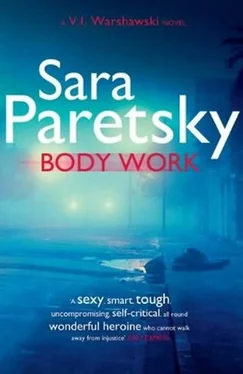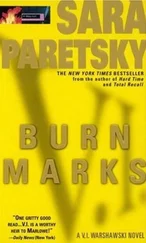“I was close to Nadia at one time.” I didn’t feel like explaining my connection as a private investigator. “And you?”
“I’m sort of an honorary uncle to all of them, especially since poor Ernie had his accident.” He stuck a hand inside his coat and pulled out a card: Rainier Cowles, Attorney.
“They seem dogged by misfortune; they’re lucky to have an honorary uncle who’s a lawyer.” I didn’t give him a card of my own; a La Salle Street lawyer like him probably wouldn’t take kindly to a PI sniffing around the Guamans. “I don’t know the family well. Can Ernest be left alone?”
“Not really. It’s not that he’s dangerous, but his impulses are out of whack. Cristina worries about him leaving the stove on, that kind of thing. Lazar’s mother lives with them, helps keep an eye on Ernest.”
“So how do they manage?”
I tried to imagine what home life must be like for Clara and her parents: hard work for the parents, but painful for a teenager who had to put her own life on hold.
“Are you a social worker looking for a customer?” His eyebrows were raised.
I smiled. “Like you, I was worrying about the Guamans’ welfare, wondering how they cope. And I gather there was another sister who also died-Alexandra.”
“They don’t like to talk about her.” His voice was bland, but all the muscles in his face tightened.
“How did she die?”
One of Ernie’s outbursts came back to me: Allie. Allie is a dove. When Nadia lay in my arms, her last word had been “Allie.” Not bitterness at ending her life in an alley-she thought my face bending over hers was that of her dead sister. My insides twisted in an involuntary spasm of grief.
“You don’t know?” Cowles said. “It doesn’t sound to me as though you ever knew Nadia at all.”
“We were close once,” I repeated, “but not for long. She let me know Allie was very important to her, but she didn’t spell out why.”
His face relaxed again. “I’d let that dead dog lay, then. It’s too painful to Cristina and Lazar-you’ll never hear them talk about Alexandra. By the way, who was the woman who interrupted the service? She knocked poor Father Ogden off balance.”
I shrugged. “Her name is Karen Buckley.”
“And what was she to Nadia?”
I shook my head. “Anybody’s guess.”
“What’s yours?”
I smiled again. “Not enough data to begin to guess.”
“So you’re a careful woman, are you? Not a risk taker, hmm?”
For some reason, the time I’d swung from a gantry and landed in the Sanitary Canal flashed through my head, and I laughed but didn’t say anything.
He eyed me narrowly, annoyed at my frivolity but smart enough not to expose himself to possible ridicule. He looked at his watch: the conversation was over. He asked perfunctorily if I was heading to the cemetery, and when I said no, he strode briskly down the street to his car. It was a BMW sedan, which looked a bit like him-expensive cut, shiny black exterior, sleek lines.
I moved slowly to my Mustang. This was its third winter in Chicago, and it didn’t look sleek at all. It looked like me, tired and even confused, since the front and rear axles seemed to be pointing in opposite directions.
11 The Mama and the Papa, in Concert
Back in my office, I found messages from Lotty and Freeman Carter. Lotty had called to say that her neurosurgeon, Dr. Rafael, had visited Chad at Cermak Hospital. Rafael had insisted on his removal to Beth Israel. Freeman’s message let me know he’d provided the court order to expedite Chad’s move-he should be at Beth Israel already.
I called Freeman to thank him, and tried to reach Lotty, both to thank her and to try to get an idea about Chad’s health. Unfortunately, she wasn’t available, and the charge nurse had a scrupulous sense of protocol: I wasn’t part of the family or one of the lawyers; I didn’t get any news. John Vishneski’s phone was turned off; that probably meant he was with his son in the ICU. I asked him to call me and opened the case file I’d started on Chad.
I added Rainier Cowles’s name to the Vishneski file, but the name sounded so bogus I did a LexisNexis check on him. He was a partner at Palmer & Statten, one of the globe’s megafirms whose Chicago presence occupied eight floors of a Wacker Drive high-rise.
Cowles had grown up in the northwest suburbs and was respectably educated, with a BA from Michigan and his JD/MBA from Penn. He’d joined Palmer & Statten right after passing the bar, and during the next twenty years had moved steadily up the path to partner. The Palmer & Statten website listed his particular expertise as corporate litigation, with a specialty in multinationals.
I didn’t find a record of a name change, but it still seemed incredible that parents had burdened their child with such a name. “Prince Rainier,” I murmured to the computer. He’d probably been called that a ton in his subdivision growing up. Maybe it’s why he’d put on the carapace of corporate success. Imposing trial presence, important car. But he must have a soft center, or he wouldn’t be involved with the hard-luck Guamans. Or maybe he’d represented them in litigation over Ernie’s injuries.
None of this speculation was helping me look at Chad’s relationship with Nadia.
“The client is the boss. His son is innocent. Get to work proving it,” I said aloud in my sternest voice and phoned Mona Vishneski.
Mona had left her mother’s as soon as she learned of her son’s arrest, and was now back in Chicago. She was staying with her ex-husband in Wrigleyville, which John hadn’t bothered to tell me. She agreed to meet me for a cup of tea at Lilith’s, a little café on Southport near John’s apartment, around five.
The snow had started again. Lilith’s was six blocks from my apartment. With the ice and snow packed along the curbs making street parking a challenge, it was better to put my car in my building’s alley garage and walk. I carried my laptop with me in a waterproof case.
It was already dark by the time I got to the café. The warmth and lights inside seemed feeble against the wind whipping snow pellets against the windows. I ordered a double macchiato and found a table as far from the door as possible.
While I waited for Mona, I started to download the reports LifeStory and the Monitor Project had given me on Olympia, Karen Buckley, and on Chad himself. I was especially curious about Karen, after her performance at Nadia’s funeral.
The most important question-who had known whom and how-wasn’t one the computer could answer reliably, although I took a stab at the question through MySpace and Facebook. Olympia had a Facebook page, but you had to have her permission to see any details, such as her cyberfriends. Chad had a MySpace page, but none of the women were among his “friends.” I couldn’t find Karen Buckley on any of the social networks.
Fishing around to see where Karen’s and Nadia’s lives might have intersected, I checked to see if they had gone to art school together. I already had looked up Nadia’s details-her training at Columbia College in the south Loop, her job at a big design firm, followed by precarious freelancing after she was laid off-but I couldn’t find any information on Karen Buckley. A quick search revealed hundreds of Karen Buckleys-singers, quilters, doctors, lawyers-across the country, but only four dozen Karen Buckleys or K. Buckleys in our four-state area. About six of those seemed to match the Body Artist’s race and age. None of them had a findable history as an artist.
Unlike most artists, who are at pains to tell you where they’ve trained, where they’ve held shows, what museums own their work, Karen’s history wasn’t just sketchy, it was missing altogether. She didn’t list her education or her shows on the embodiedart.com website. She didn’t offer any personal information at all.
Читать дальше












